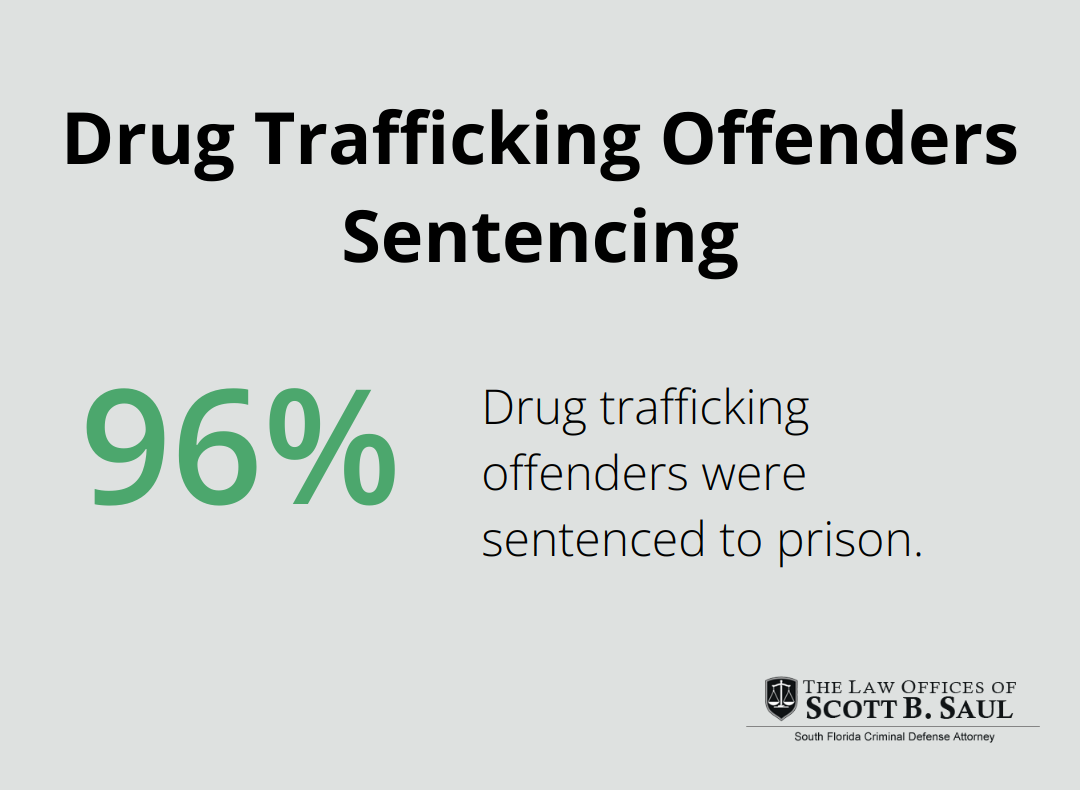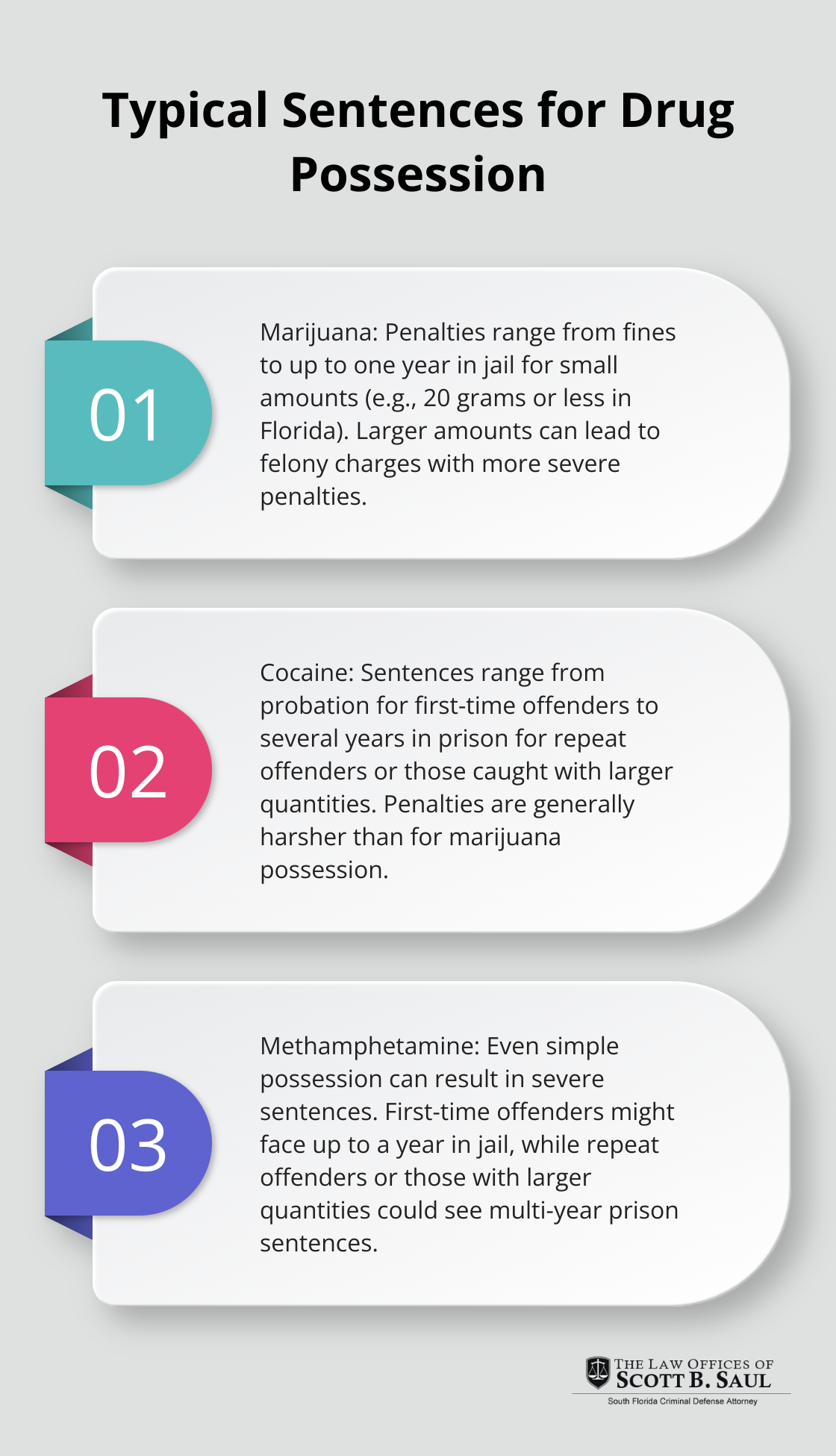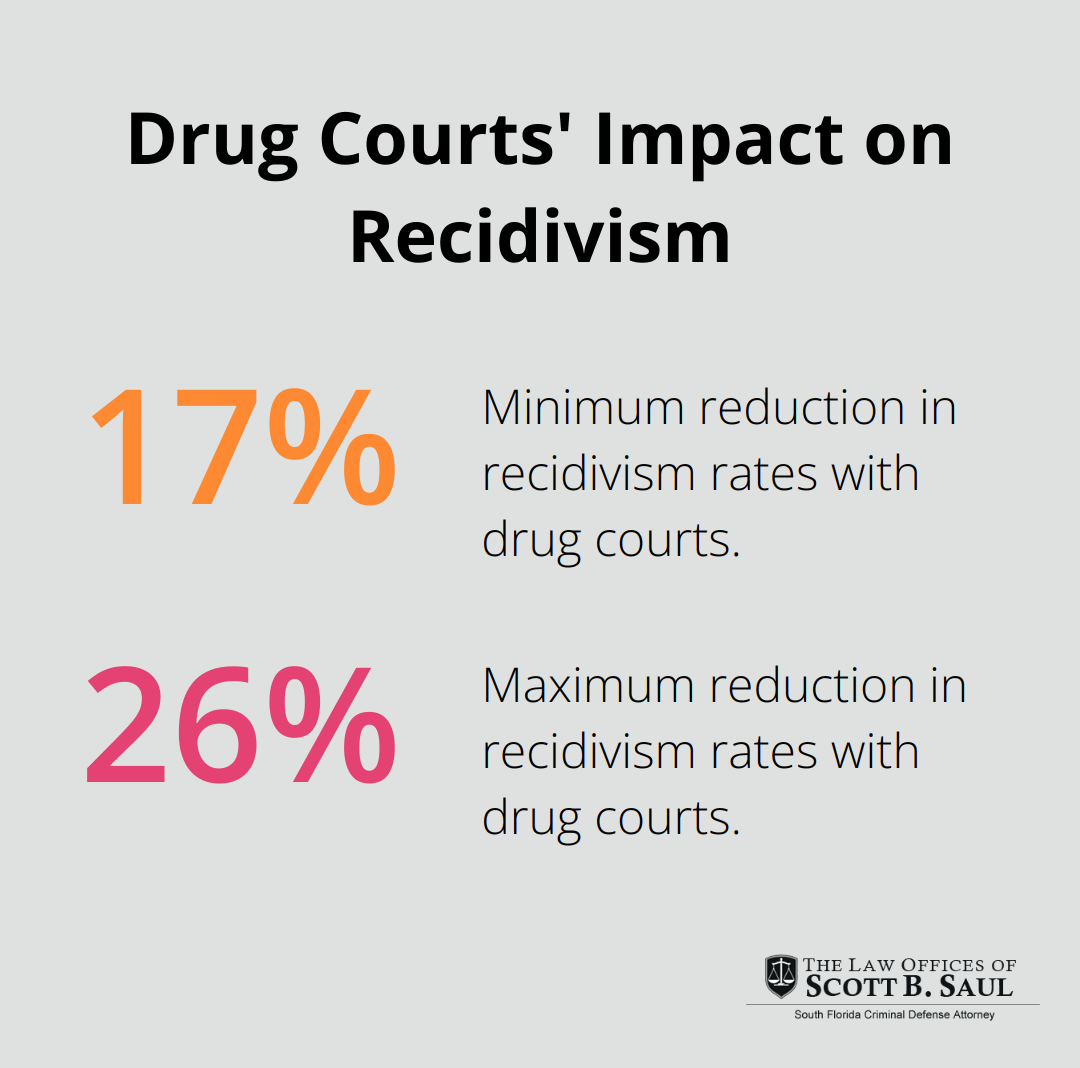How Long Is the Average Sentence for Drug Possession?
By : saulcrim | Category : Criminal Defense | Comments Off on How Long Is the Average Sentence for Drug Possession?
28th Jul 2025

Drug possession charges can have serious consequences, and many people wonder about the average prison sentence for drug possession. The reality is that sentencing varies widely based on several factors.
At Law Offices of Scott B. Saul, we’ve seen how different circumstances can impact the outcome of drug possession cases. This post will explore the key elements that influence sentencing and provide insight into typical sentences for various drug offenses.
What Impacts Drug Possession Sentences?
Drug possession sentences vary widely based on several key factors. Understanding these can help defendants and their families prepare for potential outcomes.
Drug Type and Quantity
The type and amount of drug involved significantly impact sentencing. For example, possession of 100 grams of heroin typically results in harsher penalties than possession of the same amount of marijuana. The average sentence for individuals trafficking drugs was 82 months but varied by drug type. 96.5% were sentenced to prison, and 54.6% were convicted of an offense.

Criminal History
A defendant’s prior record plays a crucial role in sentencing decisions. First-time offenders often receive more lenient sentences, while repeat offenders face harsher penalties. The U.S. Sentencing Commission reports that 45.2% of drug trafficking offenders had little or no prior criminal history (Criminal History Category I), which can significantly impact their sentencing outcomes.
State Laws and Mandatory Minimums
Each state has its own laws and sentencing guidelines for drug possession. Some states have implemented mandatory minimum sentences for certain drug offenses, which can limit a judge’s discretion in sentencing. Evidence shows that long and harsh sentences are not effective for community safety.
Federal vs. State Charges
Whether a case is prosecuted at the federal or state level can greatly influence sentencing. Federal drug charges often carry more severe penalties. For example, federal trafficking of 100 grams of heroin can result in sentences ranging from five to 40 years in prison.
State charges, while still serious, may offer more flexibility in sentencing. Many states have implemented alternative sentencing options (such as drug courts or diversion programs), especially for first-time offenders.
Mitigating Factors
Courts consider various mitigating factors when determining sentences. These may include the defendant’s cooperation with law enforcement, efforts to seek treatment, or personal circumstances. For example, a defendant who voluntarily enters a rehabilitation program might receive a more lenient sentence than one who does not show any initiative to address substance abuse issues.
The complex interplay of these factors underscores the importance of understanding specific drug laws and potential penalties. As we move forward, we’ll examine the average sentences for different types of drug possession charges, providing a clearer picture of what defendants might expect in various scenarios.
What Are Typical Sentences for Drug Possession?
Drug possession sentences vary widely based on the type and quantity of the substance involved. The Law Offices of Scott B. Saul has observed firsthand how these factors can significantly impact case outcomes. Let’s examine typical sentences for common drug possession charges.

Marijuana Possession Sentences
Marijuana possession penalties have undergone significant changes in recent years. In states where it’s legalized, possession of small amounts for personal use often results in no criminal charges. However, in states where it remains illegal, sentences can range from fines to jail time.
For example, in Florida, possession of 20 grams or less is a misdemeanor, punishable by up to one year in jail and a $1,000 fine. Possession of larger amounts can lead to felony charges with more severe penalties.
Cocaine and Crack Cocaine Possession Sentences
Cocaine possession typically carries harsher penalties than marijuana. While trafficking offenses generally result in more severe sentences than simple possession, it’s worth noting that the justice system views cocaine-related offenses seriously.
For simple possession, sentences can range from probation for first-time offenders to several years in prison for repeat offenders or those caught with larger quantities.
Heroin Possession Sentences
Heroin possession often results in some of the most severe sentences due to its classification as a Schedule I drug.
For simple possession, sentences can vary dramatically based on quantity and criminal history. First-time offenders might receive probation and mandatory drug treatment, while repeat offenders could face several years in prison.
Methamphetamine Possession Sentences
Methamphetamine possession charges often result in harsh sentences. The average sentence for methamphetamine trafficking offenders was 95 months.
Even for simple possession, sentences can be severe. First-time offenders might face up to a year in jail, while repeat offenders or those caught with larger quantities could see multi-year prison sentences.
It’s important to note that these are general trends, and individual cases can vary significantly. Factors such as the specific jurisdiction, the judge’s discretion, and the defendant’s personal circumstances all play key roles in determining the final sentence.
The complexity of drug possession cases underscores the importance of experienced legal representation. A skilled attorney can navigate the intricacies of both federal and state drug laws, potentially mitigating sentences and protecting clients’ rights. This leads us to consider alternatives to incarceration, which can offer a path to rehabilitation rather than punishment for some drug offenders.
Alternatives to Incarceration for Drug Possession
Drug possession charges don’t always result in jail time. Many jurisdictions now offer alternative programs that focus on rehabilitation rather than punishment. These options can transform the lives of individuals struggling with substance abuse.
Drug Courts: A Recovery-Focused Approach
Drug courts have become a popular and effective alternative to traditional sentencing. These specialized court programs prioritize treatment and rehabilitation for non-violent drug offenders. Participants undergo strict supervision, frequent drug testing, and mandatory counseling.
Drug courts reduce recidivism rates by 17 to 26 percent compared to traditional criminal justice system processing. This approach not only helps individuals overcome addiction but also saves taxpayer money (in the long run).

Diversion Programs: Opportunities for a Fresh Start
Many states offer pre-trial diversion programs for first-time offenders. These programs typically include drug education classes, community service, and regular check-ins with a probation officer. Successful completion may lead to charge dismissal, allowing individuals to avoid a criminal record.
Florida’s Pretrial Intervention Program (for example) allows eligible defendants to participate in supervised release programs as an alternative to prosecution. This approach benefits young adults or those without prior criminal history.
Treatment-Based Alternatives: Addressing Root Causes
Some jurisdictions provide treatment-based alternatives to incarceration. These programs address the underlying causes of substance abuse through intensive therapy, support groups, and (in some cases) residential treatment facilities.
Prevention and early intervention strategies can reduce the impact of substance use and mental disorders in America’s communities.
Eligibility and Legal Representation
Not all cases qualify for alternative programs. Factors such as offense nature, criminal history, and local laws determine eligibility. An experienced attorney can assess your situation and advocate for the best possible outcome, whether that’s an alternative program or a strong defense in court.
The Law Offices of Scott B. Saul, with over 30 years of expertise in criminal defense, understands the intricacies of these alternative programs. Our team works to help eligible clients access these opportunities, potentially avoiding the long-lasting consequences of a drug conviction.
Final Thoughts
Drug possession cases involve complex factors that influence sentencing outcomes. The average prison sentence for drug possession varies widely, ranging from months to years depending on the specific circumstances. Alternative sentencing options like drug courts and diversion programs offer rehabilitation-focused approaches, potentially leading to better outcomes for individuals and society.
The landscape of drug laws and sentencing continues to evolve, with many states moving towards decriminalization of certain substances. This shift reflects changing societal views on drug use and addiction, emphasizing treatment over incarceration. However, navigating the legal system remains challenging, underscoring the importance of professional legal representation in drug possession cases.
At Law Offices of Scott B. Saul, we bring decades of experience in criminal defense to every case. Our team understands the nuances of drug laws in South Florida and provides personalized attention to protect our clients’ rights and futures. As drug laws change, seeking expert legal counsel becomes more important than ever for those facing charges or wanting to understand their rights.
Archives
- January 2026 (1)
- December 2025 (9)
- November 2025 (8)
- October 2025 (8)
- September 2025 (9)
- August 2025 (8)
- July 2025 (8)
- June 2025 (9)
- May 2025 (9)
- April 2025 (8)
- March 2025 (9)
- February 2025 (8)
- January 2025 (9)
- December 2024 (10)
- November 2024 (5)
- July 2024 (2)
- June 2024 (2)
- May 2024 (2)
- April 2024 (2)
- March 2024 (2)
- February 2024 (2)
- January 2024 (2)
- December 2023 (2)
- November 2023 (2)
- October 2023 (2)
- September 2023 (2)
- August 2023 (1)
- July 2023 (2)
- June 2023 (2)
- May 2023 (2)
- April 2023 (2)
- March 2023 (2)
- February 2023 (2)
- January 2023 (2)
- December 2022 (2)
- November 2022 (2)
- October 2022 (2)
- September 2022 (2)
- August 2022 (2)
- July 2022 (2)
- June 2022 (2)
- May 2022 (2)
- April 2022 (2)
- March 2022 (2)
- February 2022 (2)
- January 2022 (2)
- December 2021 (2)
- November 2021 (2)
- October 2021 (2)
- September 2021 (2)
- August 2021 (2)
- July 2021 (2)
- June 2021 (2)
- May 2021 (2)
- April 2021 (2)
- September 2020 (5)
- July 2020 (4)
- June 2020 (4)
- May 2020 (4)
- April 2020 (5)
- March 2020 (4)
- February 2020 (4)
- January 2020 (4)
- December 2019 (1)
- November 2019 (4)
- October 2019 (4)
- September 2019 (4)
- August 2019 (4)
- July 2019 (5)
- June 2019 (4)
- May 2019 (4)
- April 2019 (4)
- March 2019 (4)
- February 2019 (4)
- January 2019 (4)
- December 2018 (4)
- November 2018 (5)
- October 2018 (5)
- September 2018 (4)
- August 2018 (4)
- July 2018 (7)
- June 2018 (4)
- May 2018 (4)
- April 2018 (8)
- March 2018 (4)
- February 2018 (4)
- January 2018 (4)
- November 2017 (4)
- October 2017 (4)
- September 2017 (4)
- August 2017 (7)
- July 2017 (6)
- June 2017 (4)
- May 2017 (4)
- April 2017 (4)
- March 2017 (4)
- February 2017 (7)
- January 2017 (4)
- December 2016 (7)
- November 2016 (4)
- October 2016 (4)
- September 2016 (10)
- August 2016 (4)
- July 2016 (4)
- June 2016 (4)
- May 2016 (4)
- April 2016 (4)
- March 2016 (4)
- February 2016 (7)
- January 2016 (4)
- December 2015 (5)
- November 2015 (4)
- October 2015 (7)
- September 2015 (4)
- August 2015 (4)
- July 2015 (13)
- June 2015 (9)
- May 2015 (8)
- April 2015 (6)
- March 2015 (4)
- February 2015 (4)
- January 2015 (4)
- December 2014 (4)
- November 2014 (4)
- October 2014 (4)
- September 2014 (3)
Categories
- Adjudication (1)
- Bankruptcy (1)
- Burglary Crimes (3)
- calendar call (1)
- Car Accident (1)
- Criminal Defense (382)
- Cyber Crimes (7)
- DNA (1)
- Domestic Violence (9)
- Drug Crimes (5)
- DUI (12)
- Embezzlement (1)
- Environmental Crimes (4)
- Expungement Law (2)
- Federal Sentencing Law (3)
- Firearm (3)
- Forgery (4)
- General (82)
- Healthcare (3)
- Immigration (1)
- Indentity Theft (1)
- Insurance (5)
- judicial sounding (2)
- Juvenile Crimes (4)
- Manslaughter (4)
- Money Laundering (3)
- Organized Crime (1)
- Racketeering (1)
- Reckless Driving (3)
- RICO (3)
- Sealing and Expunging (2)
- Sex Offense (1)
- Shoplifting (1)
- Suspended Driver's License (1)
- Traffic (4)
- Trending Topics (1)
- White-collar Offenses (1)

